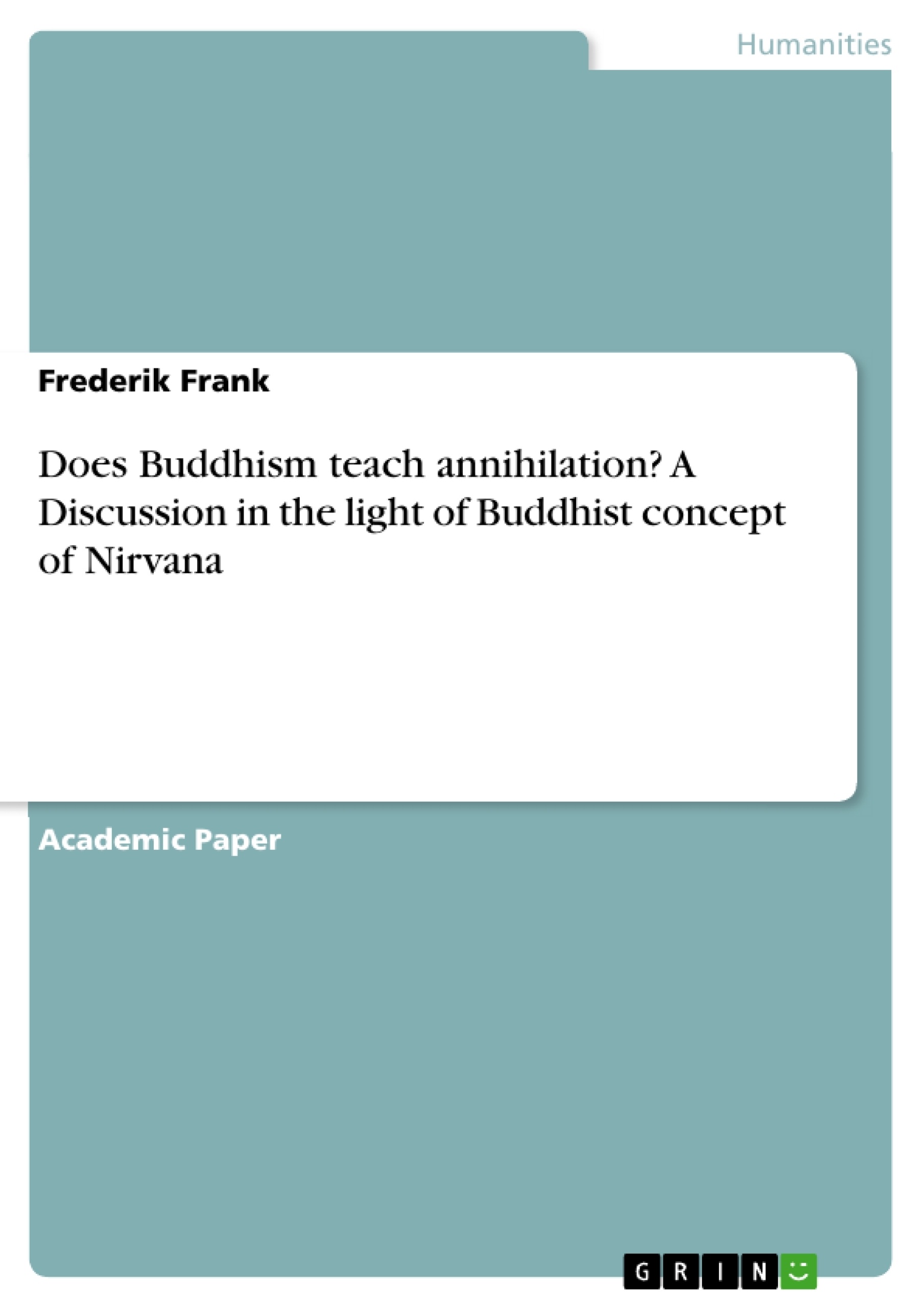In comparison to e.g. Christianity and its concept of Heaven and Hell, Buddhism does not give a concrete positive description of Nirvana, since it lies beyond what human language is able to explain. Buddhism mostly circumscribes Nirvana by saying that it is the absence of suffering and the exit of the cycle of rebirths. Therefore, by interpreting Nirvana, the final goal of Buddhism, without further knowledge, one could tend to believe that Buddhism aims for the annihilation of oneself.
In order to analyse whether this statement is correct, I will provide a more in depth understanding of what Nirvana is, how Buddhism deals with the identity or the “self” (Anatta) of an individual and in what way this is linked to the cycle of rebirths.
This goal of the essay with regards to content will be achieved by firstly clarifying the underlying principle of Nirvana and how it is imbedded into Buddhist teaching. Secondly, by taking into account various literature and reflecting on these, I will elaborate on the human language, the typical philosophical dualism of possible states after death, and finally, as the main part of this paper, I will discuss the law of cause and effect, the impermanence and the Buddhist concept of non-self (Anatta). Focusing on the last three subtopics, I will then transfer these ideas on the essay question to reason a justified conclusion.
Table of Contents
- Introduction
- Theoretical principles
- The concept of Nirvana and its embedment in Buddhism
- The term annihilation
- Analysis: Does Buddhism teach annihilation?
- Description of the misconception
- Human Language and philosophical dualism
- Law of Cause and Effect, Impermanence and non-self
- Consequences for the understanding of Nirvana
- What is there after Nirvana?
- Conclusion
Objectives and Key Themes
This essay aims to analyze whether Buddhism teaches annihilation, particularly in light of the Buddhist concept of Nirvana. It delves into the nature of Nirvana and its relation to the Buddhist understanding of the self (Anatta) and the cycle of rebirths.
- The nature and significance of Nirvana in Buddhist teachings
- The limitations of human language in describing experiences beyond the physical realm
- The Buddhist concept of non-self (Anatta) and its connection to the cycle of rebirths
- The role of the law of cause and effect (Karma) and impermanence in understanding Nirvana
- The implications of these concepts for interpreting the question of annihilation in Buddhism
Chapter Summaries
The essay begins by introducing the concept of Nirvana and its role in Buddhism. It discusses the difficulty of defining Nirvana due to the limitations of human language and sensory experiences. The essay then explores the Four Noble Truths, highlighting the inherent suffering (Dukkha) and its connection to craving, hatred, and delusion. It argues that the end of suffering is possible through extinguishing these negative tendencies, achieved by practicing the Noble Eightfold Path.
Further, the essay delves into the concept of non-self (Anatta) and how it relates to the cycle of rebirths. It explores the law of cause and effect, impermanence, and how these concepts contribute to understanding the nature of Nirvana. The essay also discusses the misconception of annihilation and challenges the typical philosophical dualism associated with states after death.
Keywords
The essay explores key concepts such as Nirvana, Dukkha, Anatta, the Four Noble Truths, the Noble Eightfold Path, the law of cause and effect (Karma), impermanence, and the limitations of human language in describing transcendent experiences.
- Citation du texte
- Frederik Frank (Auteur), 2016, Does Buddhism teach annihilation? A Discussion in the light of Buddhist concept of Nirvana, Munich, GRIN Verlag, https://www.grin.com/document/367467



